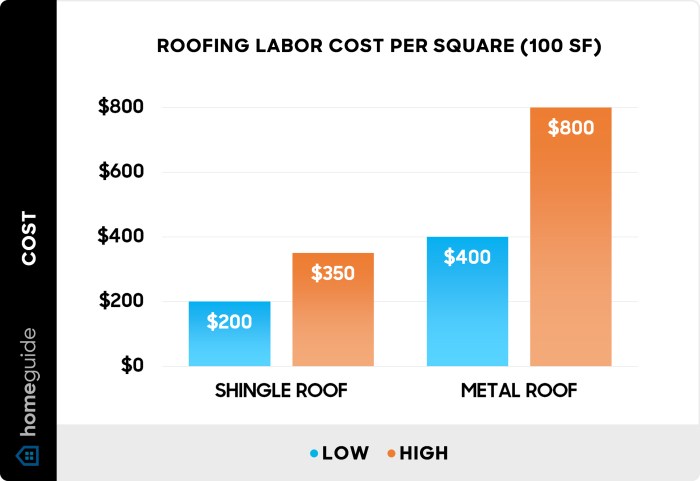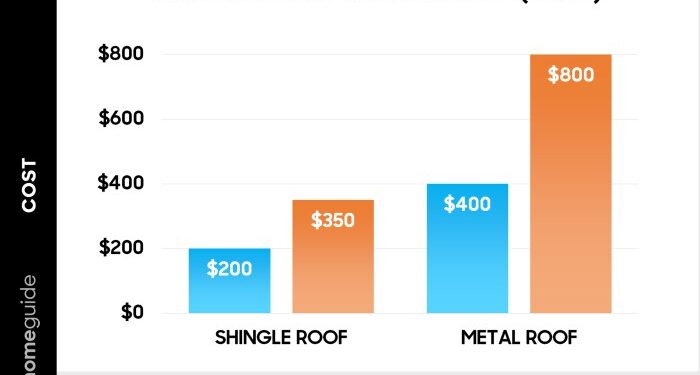Beginning with Roof Estimate Calculator: How Much Does a New Roof Cost?, the narrative unfolds in a compelling and distinctive manner, drawing readers into a story that promises to be both engaging and uniquely memorable.
In this comprehensive guide, we will delve into the world of roof estimate calculators and explore the various factors that influence the cost of a new roof. From materials to labor costs, we'll cover it all to help you make informed decisions about your roofing needs.
Roof Estimate Calculator
A roof estimate calculator is a tool used to determine the cost of installing a new roof on a residential or commercial property. It helps homeowners, contractors, and professionals to get an accurate estimate of the total expenses involved in a roofing project.
How a Roof Estimate Calculator Works
A roof estimate calculator typically takes into account various factors such as the size of the roof, the type of roofing material to be used, the pitch of the roof, the complexity of the roof design, and the labor costs in the specific geographic location.
Users input these details into the calculator, and it generates a cost estimate based on the provided information.
Comparison of Various Roof Estimate Calculators
There are several roof estimate calculators available online, each offering slightly different features and functionalities. Some calculators may focus on specific types of roofing materials, while others provide a more comprehensive estimate that includes labor costs and additional expenses. It is essential to compare multiple calculators to ensure you get the most accurate estimate for your roofing project.
Factors Affecting Roof Cost
When determining the cost of a new roof, several key factors come into play that influence the overall estimate. These factors include the choice of materials, the size of the roof, and the complexity of the roof design.
Material Choice
The material you choose for your roof can have a significant impact on the overall cost of the project. Different materials come at varying price points and offer different levels of durability and aesthetic appeal. For example, asphalt shingles tend to be more budget-friendly compared to premium materials like metal or slate.
It's important to consider both the upfront cost and the long-term maintenance and replacement costs when selecting the material for your new roof.
Roof Size and Complexity
The size and complexity of your roof also play a crucial role in determining the cost of a new roof. A larger roof will require more materials and labor, resulting in a higher overall cost. Additionally, roofs with complex designs, multiple slopes, or intricate architectural features may require specialized installation techniques, which can add to the total cost of the project.
It's essential to factor in these considerations when requesting estimates for a new roof to ensure an accurate assessment of the costs involved.
Types of Roofing Materials
When it comes to choosing the right roofing material for your new roof, there are several options to consider. Each type of roofing material comes with its own set of costs, benefits, and maintenance requirements.
Asphalt Shingles
Asphalt shingles are one of the most common types of roofing materials used for residential homes. They are affordable, easy to install, and come in a variety of colors. However, asphalt shingles have a shorter lifespan compared to other materials and may require more frequent maintenance.
Metal Roofing
Metal roofing is known for its durability and longevity. While metal roofs may have a higher upfront cost, they can last 50 years or more with minimal maintenance. Metal roofs are also energy-efficient and environmentally friendly.
Tile Roofing
Tile roofing is popular for its aesthetic appeal and longevity. Roof tiles are available in various materials such as clay, concrete, and slate, offering a range of colors and styles. While tile roofs are durable and can last for decades, they can be heavy and may require additional structural support.
Other Materials
Other roofing materials include wood shakes, cedar shingles, and synthetic materials. Wood shakes and cedar shingles offer a natural look but may require more maintenance. Synthetic materials like composite shingles are designed to mimic the look of natural materials while providing added durability and weather resistance.Overall, the choice of roofing material will depend on factors such as budget, climate, and personal preference.
It's important to consider the costs, benefits, durability, and maintenance requirements of each type of material before making a decision for your new roof.
Labor Costs and Installation
Labor costs play a significant role in determining the total estimate for a new roof. These costs encompass the expenses associated with hiring skilled labor to install the roofing materials properly.Installation difficulties can impact labor costs significantly. Factors such as the complexity of the roof design, steepness of the roof, and the presence of obstacles like chimneys or skylights can increase the amount of time and effort required for installation.
This, in turn, can lead to higher labor costs.
Tips for Finding Reputable Roofing Contractors
- Research and ask for recommendations from friends, family, or neighbors who have recently had their roofs replaced.
- Check online reviews and ratings of roofing contractors in your area to gauge their reputation and reliability.
- Ensure the roofing contractor is licensed, bonded, and insured to protect yourself in case of any accidents or damages during the installation process.
- Get multiple quotes from different contractors to compare prices and services offered. Be wary of unusually low bids, as they may indicate subpar workmanship or the use of inferior materials.
- Ask for references from past clients and inspect completed projects to assess the quality of the contractor's work.
- Have a detailed written contract outlining the scope of work, materials to be used, project timeline, and payment schedule to avoid any misunderstandings.
Additional Costs and Budgeting

When budgeting for a new roof, it's crucial to consider additional costs that may arise during the project. Unexpected expenses can impact your overall budget, so it's important to plan ahead and be prepared. One way to manage these costs is by obtaining multiple estimates from different roofing contractors.
Additional Costs in a Roof Estimate
- Permit Fees: Depending on your location, you may need to obtain permits for your roof replacement, which can add to the overall cost.
- Roof Deck Repair: If the underlying roof deck is damaged, it will need to be repaired or replaced before the new roof can be installed.
- Chimney or Skylight Work: Any additional work needed on chimneys or skylights can increase the cost of the project.
- Gutter Replacement: It's common to replace gutters when getting a new roof, so factor in this cost as well.
Budgeting for Unexpected Expenses
- Set Aside a Contingency Fund: Allocate a portion of your budget for unexpected expenses that may arise during the roof replacement project.
- Communicate with Your Contractor: Keep an open line of communication with your roofing contractor to address any unforeseen issues as they arise.
- Research Financing Options: Explore financing options to help cover any unexpected costs that may exceed your initial budget.
Importance of Obtaining Multiple Estimates
- Cost Comparison: Getting multiple estimates allows you to compare prices and services offered by different contractors, helping you make an informed decision.
- Quality Assurance: Different contractors may offer different materials or installation methods, so obtaining multiple estimates ensures you choose the best option for your needs.
- Negotiation Power: Having multiple estimates gives you leverage to negotiate pricing and terms with potential contractors.
DIY vs. Professional Installation
When it comes to replacing your roof, one important decision to make is whether to tackle the project yourself or hire professional roofers. Let's compare the costs and benefits of DIY roof installation versus hiring professionals.
Cost Comparison
DIY roof replacement can save you money on labor costs, but keep in mind that you'll need to purchase all the materials and tools required for the job. On the other hand, hiring professionals may be more expensive upfront, but they can ensure quality workmanship and potentially save you money in the long run by avoiding costly mistakes.
Risks and Challenges
DIY roof replacement comes with risks such as improper installation leading to leaks or structural damage, as well as potential safety hazards for those inexperienced with working at heights. It's essential to consider your skill level, available time, and comfort with the task before deciding to go the DIY route.
Recommendations
If you have experience with roofing projects, access to the necessary tools, and feel confident in your abilities, DIY roof installation could be a viable option. However, if you're unsure or concerned about the complexity of the task, it's best to hire professionals to ensure a successful and safe roof replacement.
Final Wrap-Up
In conclusion, understanding the intricacies of roof estimates and costs is crucial for any homeowner embarking on a roofing project. By considering the factors discussed here and utilizing the right tools like a roof estimate calculator, you can confidently plan and budget for your new roof.
Answers to Common Questions
What factors influence the cost of a new roof?
Factors such as material choice, roof size, complexity, labor costs, and additional expenses can all impact the overall cost of a new roof.
Is it advisable to opt for DIY roof installation?
While DIY installation may save money, it comes with risks and challenges. Hiring professionals ensures quality work and may be a better long-term investment.
How can I find reputable roofing contractors for installation?
Research reviews, ask for referrals, and obtain multiple estimates to compare prices and services offered by different contractors.















